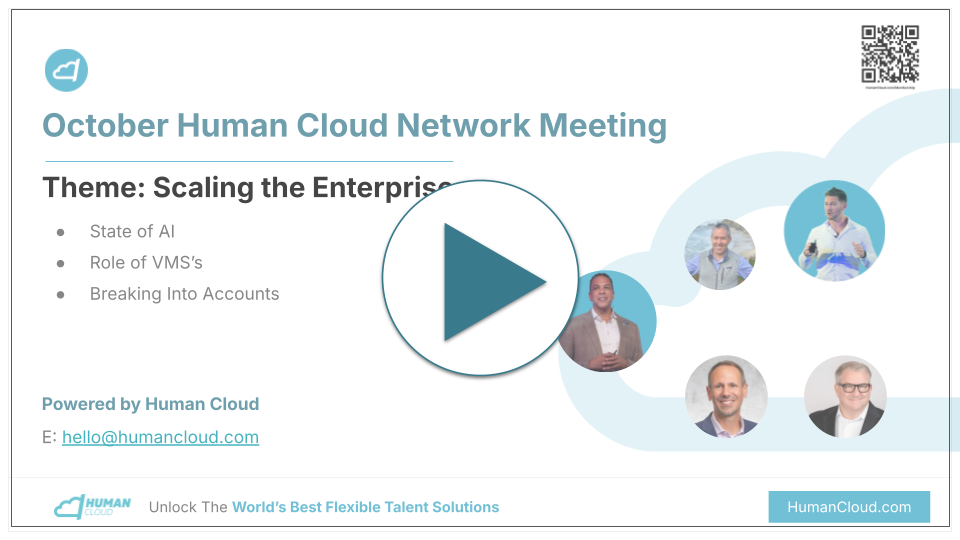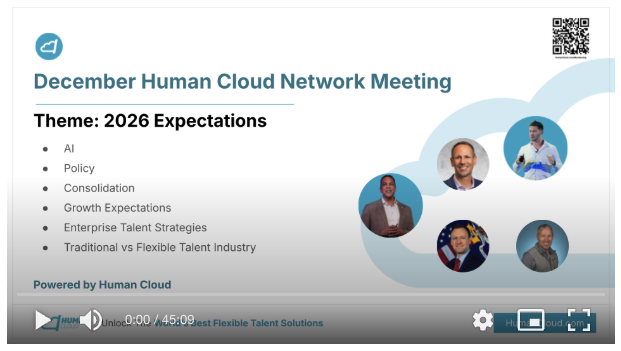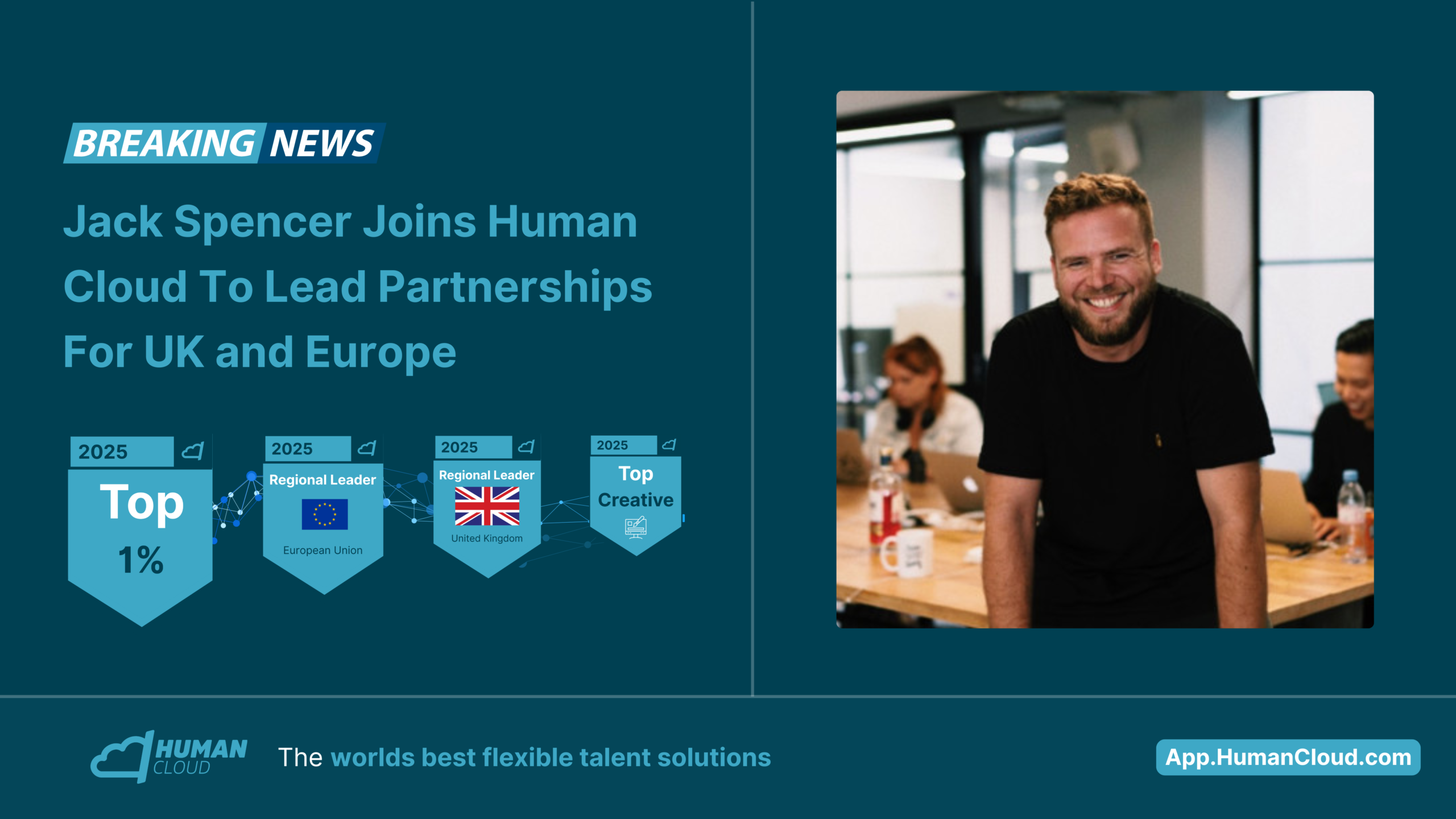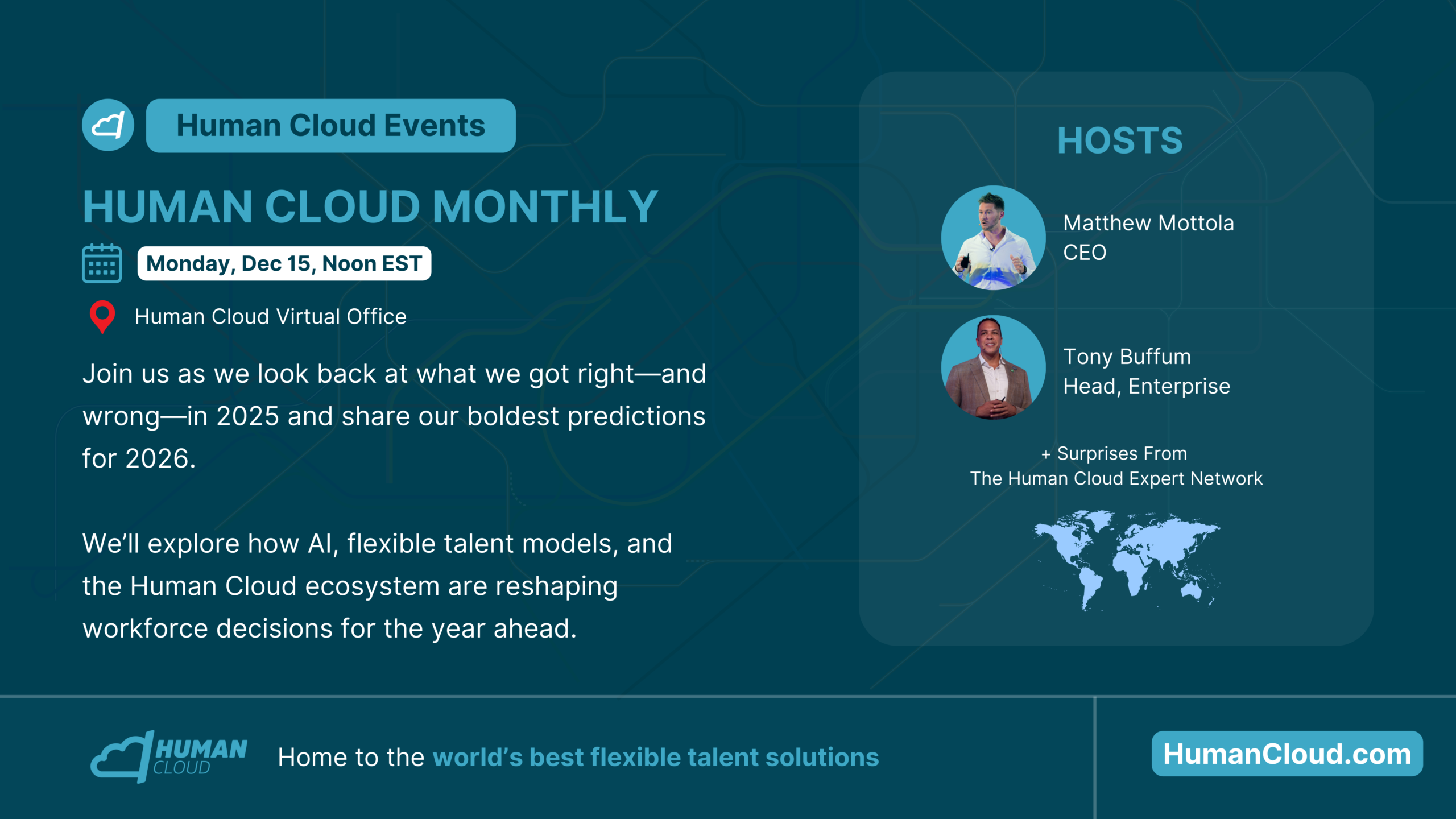🚨 Human Cloud Partners With SIA To Highlight This Year’s Top Talent Solutions 🚨
HC Network Monthly Debrief, October, 2025
AI, The Role of The VMS, Consolidation, Breaking Into Accounts, and HC’s Executive Council Review
Recap of the HC Network Meeting

Human Cloud Team
Share this!
LinkedIn
Email
Twitter
Print
Executive Highlights
7 Videos
1:08
0:52
0:44
1:32
Key Highlights:
- Industry News & Market Trends: Matthew Mottola unveiled significant industry shifts, including Deel’s impressive $300 million funding round at a $17 billion valuation, Mercor’s ascent to a $10 billion valuation, and Google’s groundbreaking quantum algorithm. He also addressed recent substantial layoffs at Amazon (30K), CHEG (40%), and Target (over a thousand), alongside Scale AI’s innovative transition of contractors to its proprietary gig marketplace. Recurring themes from enterprises focused on “readiness” for gig and flexible talent platforms, a notable increase in RFPs for flexible talent solutions, and a growing demand for a hybrid model between 1099 and W2 visualization to achieve enhanced flexibility.
- Economic Update: Tony Buffum provided an insightful economic overview, highlighting the Federal Reserve’s continued interest rate reductions, a strategic move prioritizing unemployment in response to recent widespread layoffs. This environment, characterized by cheaper capital, is fostering consolidation and acquisitions, thereby creating a favorable landscape for contracted headcount as organizations strategically reduce full-time staff.
- The Evolving Role of the VMS: Brian Hoffmeyer, SVP of Market Strategies at Beeline, elucidated the dual function of a Vendor Management System (VMS): serving as the system of record for all forms of contract labor and non-employee expenditure, which is indispensable for comprehensive talent management. He underscored the imperative for VMSs to evolve, seamlessly integrating alternative talent platforms to ensure their inclusion in critical decision-making processes regarding work execution, and assisting clients in achieving cost savings and compliance.
- Strategies for Enterprise Engagement: Chris Perkins addressed the inherent challenges within the marketing services sector, citing organizational complexity, the critical need for objectivity in service access and delivery, and the demand for precise talent. He stressed the importance of compelling content and the articulation of one’s “superpowers” to break into accounts.
- The State of AI: Matt Coatney touched on how currently AI is boosting “personal productivity” through intelligent assistants and co-pilots and yielding substantial productivity gains (ranging from 30-70% in software development). Enterprise-level applications are rapidly emerging, integrating large language models into established platforms such as Salesforce. The “near” future anticipates the widespread adoption of “workflows” or light automation, while “agents” are still in development, progressing towards more intricate human-level judgment scenarios.
- AI and Layoffs: Matt Coatney expressed a degree of skepticism regarding AI as the primary driver of recent large-scale layoffs, suggesting that executives may be utilizing AI as a “palatable cover” for over-hiring during the pandemic-induced demand surges. He acknowledged, however, that AI is beginning to “arbitrage” certain domains, including low-level ghostwriting and copywriting, and criticized tech companies for disproportionately laying off non-core technologists.
- Legal Risks and Governance in AI: Matt Coatney delved into the legal ramifications of AI, particularly concerning discriminatory hiring practices stemming from biased training data. He emphasized that the more immediate and significant risks are “reputational and governance related,” encompassing issues such as quality control and the subtle fabrication of information in reports presented as human-generated work.
- Beeline’s Acquisition of MBO: Brian Hoffmeyer elaborated on Beeline’s strategic acquisition of MBO, aimed at enhancing their capacity to manage independent workers and payroll. He also touched on how MBO’s distinctive “business services” for qualifying independent workers and its premium “independent talent network” were pivotal factors in the acquisition, with MBO functionality slated for integration into both Beeline’s enterprise and professional VMS products.
- The Blended Workforce and AI Agents: Steve King initiated a compelling discussion on the evolving “blended workforce,” which now seamlessly integrates traditional employees, independent workers, and various forms of agentic AI. Brian Hoffmeyer confirmed that Beeline is already encountering practical use cases for AI agents requiring access to corporate systems. Tony Buffum drew parallels to the concepts explored in the book Flash Teams, where human judgment effectively complements AI-completed tasks.
- Business Model Impact of AI Agents: Jeff Nugent raised pertinent concerns regarding the taxation and liability implications of AI agents displacing jobs, potentially disrupting traditional staffing models. John Healy proposed a shift in focus from intermediaries creating new products to leveraging agentic AI to “enhance the value of the worker,” thereby increasing margins and delivering greater value to the workplace.
- Integrating AI with Talent Platforms: Shannon Denton articulated their objective to cultivate the “strongest AI-enabled workforce in marketing” by equipping their freelancers with essential AI skills. Ryan Tlustosch observed that while AI undeniably enhances platform productivity, Fortune 500 customers exhibit considerable hesitancy regarding AI deployment due to paramount concerns about privacy, security, and quality assurance. Caitlin McGregor underscored the critical importance of compliance with regulations such as the EU AI Act and emphasized the enduring necessity of a “human element” in final decision-making, even when employing AI for processes like CV screening.

Human Cloud
Human Cloud connects the worlds best flexible talent solutions. Through AI driven search, contextual matching (think Amazon recommendations for business case and feature sets needed), and an embedded service layer that can be managed internally, companies can shortlist, rank, and deploy 10,000+ solutions across every geography.




